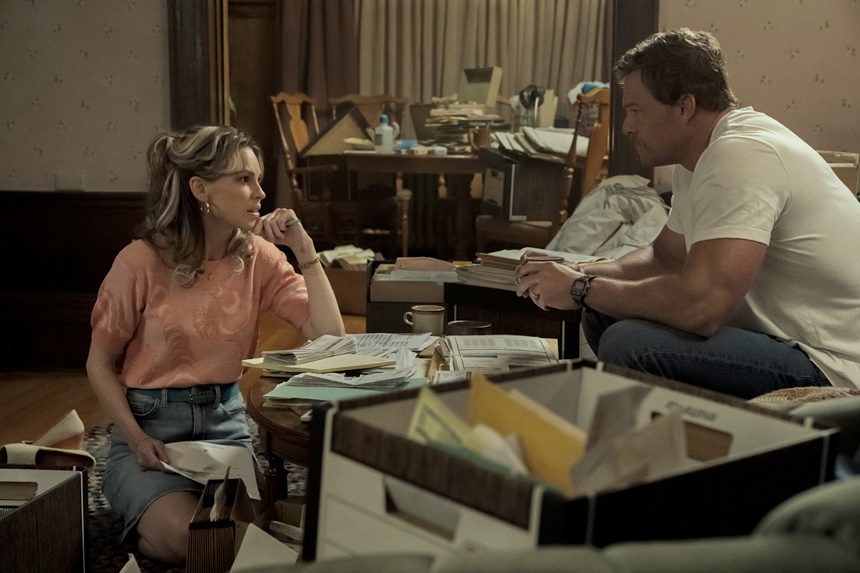Ordinary Angels
⭐️ ⭐️ ⭐️ ⭐️
Rating: PG
Run Time: 1 hour 56 minutes
Stars: Hilary Swank, Alan Ritchson, Nancy Travis
Writers: Kelly Fremon Craig, Meg Tilly
Director: Jon Gunn
Ed Schmitt has every reason to give up hope. His young wife has died after a long illness, leaving him with two little girls and a mountain of medical debts. His younger child has a congenital disease that sets him back thousands more each month, and a liver transplant to prolong her life — if an organ becomes available — will cost hundreds of thousands more.
Just keeping food on the table requires him to work dawn to dusk at his roofing business. And believe it or not, things are about to get even worse.
Lest you think the screenwriters of Ordinary Angels — one of whom happens to be the actress Meg Tilly — are laying too much on the shoulders of their protagonist, don’t blame them. The film is faithfully based on the true-life story of a Job-like Kentucky man who, in the early 1990s, found himself hanging from a strand of a string at the end of his rope, and a remarkable woman named Sharon Stevens, who inspired an entire city to help save him and his family.
Two-time Oscar winner Hilary Swank plays Sharon, a heavy-drinking, party-loving hair stylist who is barely keeping herself together as she tries to drown her own domestic sorrows. On the stern advice of her best friend (Tamala Jones of TV’s Castle), Sharon more or less randomly decides to be of service — any kind of service — to Ed, whose sad story she spotted in a newspaper.
A profoundly private and proud guy, Ed (Reacher’s Alan Ritchson) at first resists Sharon’s offers to help raise money to pay the family’s medical bills. And, admittedly, she is kinda pushy: Sharon doesn’t even tell Ed she’s holding a clip-a-thon at her beauty parlor for his benefit; she just turns up at his front door with an envelope full of cash.
It’s Ed’s mother (Last Man Standing’s Nancy Travis) who finally convinces Ed he could use some help sorting out the family’s mounting money issues. And, as it turns out, the businesswoman in Sharon proves to be remarkably adept at prioritizing expenses. (“Some bills,” she reassures Ed, “are like fine wine. They just get better with age.”) She also manages, through sheer perseverance, to get a substantial amount of the family’s debts reduced or forgiven.
But all that is just a prelude to the true challenge ahead: Ed’s younger daughter Michelle is spiraling downward, suffering one scary health crisis after another as her liver fails. She’s been moved to the top of the regional organ donor list, but the family lives so far away from the transplant center Ed will somehow have to figure out a way to fly Michelle there when the time comes.
It seems like an impossible hurdle — until, that is, Sharon once more puts her formidable powers of persuasion to work.
But Sharon is no happy warrior: Estranged from a grown, embittered son and still in denial regarding her alcoholism, her manic efforts on behalf of Ed and his children barely mask the desperation that’s tearing her apart. A relapse with the bottle very nearly undoes all the good she’s managed to accomplish.
It’s all a setup for the film’s grand finale: A convergence of Michelle’s end-stage organ failure, a ticking transplant clock…and the blizzard of the century.
Director John Gunn — known primarily for faith-based films like The Jesus Revolution and the Kurt Warner biopic American Underdog — displays a keen sense for cranking up the tension without making us want to avert our eyes. Never does he offer the promise of a happy ending: The universe of this film is one where things do go wrong, where people do die, and prayers are not always answered the way you’d like.
The platitude-free script by Tilly and Kelly Fremon Craig (Are You There, God? It’s Me Margaret) zips along like a race car steadily gaining momentum, pausing at all the right moments to reveal essential facets of each character’s personal story. Most affecting are the vignettes involving the two young sisters, huddling together in a united front against a world that seems determined to take away everything that matters to them. Their whispered conversations, seemingly overheard by the audience from another room, offer an innocent intimacy rare in the cinema.
Ultimately, the real power of Ordinary Angels lies in its sterling lead performances. Swank brings swaggering vulnerability to the role of Sharon, a supremely resourceful yet painfully insecure woman; tough as nails but always on the verge of fracture.
The big surprise here is Ritchson, who had always struck me as the high school jock who’s embarrassed to find himself in the school play (as Jack Reacher on Apple TV+, he’s a mountain of a man both in size and emotional range). Here, from the get-go, Ritchson draws us into the shadowland of Ed’s progressive pain. Even as Ed roughhouses with his daughters or celebrates a small triumph or hammers shingles into a roof, the sadness in his eyes remains inescapable.
At these moments, Ritchson, along with Gunn and his writers, offer a sobering reminder of the universality of sorrow: We are surrounded by silent sufferers, and we should never forget that, whether they want us to or not.
Touching and triumphant, Ordinary Angels is the rarest kind of feel-good film: One that isn’t afraid to remind us that even the happiest endings can bring equal measures of hurt and healing.
Become a Saturday Evening Post member and enjoy unlimited access. Subscribe now




Comments
This seems like an excellent film, Bill. One that’s not easy to watch, but one that helps people to grow (as people) with life’s circumstances, have empathy for others, and put their own difficulties, challenges and struggles into a badly needed adult perspective in this country.
It’s the kind of film that will create new brain connections. Indistinguishable audio-visual assault films (like those advertised during the Super Bowl) do just the opposite. But hey, that’s what the masses want. The stupider the better; what can I say?